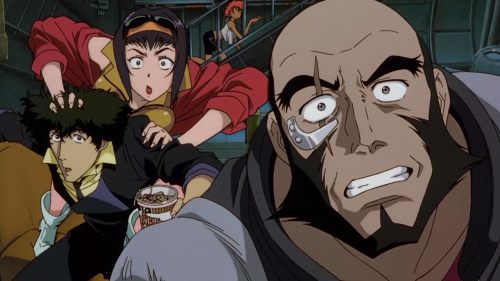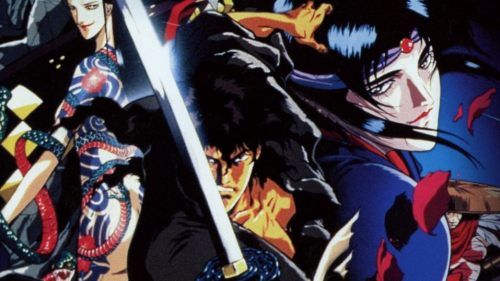Musical Anime CAROLE & TUESDAY Is An Optimistic Look Towards Our Future
From the very first moments of Carole & Tuesday, a narrator foretells of a “miraculous seven minutes” that forever changes the world, and that this is the story of the women who made it happen. Whether this is exaggeration on the part of the narrator (later revealed to be Gus, Carole & Tuesday’s manager) remains to be seen, but the general optimism of Shinichirō Watanabe’s new show seems to point in the direction that art, particularly when used to making sincere and soulful connection, really could change the world.
After Watanabe producing two decades of experimental, idiosyncratic work that took samples from various international cultures and genres, Carole & Tuesday looks towards the mainstream. With animation by studio Bones, who previously worked with Watanabe on Space Dandy, Carole & Tuesday, named for its lead characters, follows two amateur singer-songwriters as they embark on a journey toward stardom. This being a Watanabe show, it takes place in the future on a partially terraformed and colonised Mars where AI runs everything, from bank accounts and election campaigns to the creation of pop music - the show’s focus.
The score, by Canadian producer Mocky, is more stripped back than those of Cowboy Bebop, Samurai Champloo and Space Dandy, making room for the sugary, fun pop songs that make up the bulk of the show’s soundtrack. Most of the tracks written by Carole and Tuesday are simply constructed, built around a keyboard, a guitar, and earnest vocals from performers Nai Br.XX and Celeina Ann. A lot of them, not least of all the catchy opening theme, are the kind that charted well in the mid-2000s, but the show posits that these kinds of songs from the mainstream have their own value as well, when they come from the heart at least.
It’s a peculiar anime in just how much it lifts from the States, even for Watanabe. It contains all the usual loving, frivolous references that populate his older work, such as every episode title being the name of a famous pop song. In fact, it almost seems like the show was retrofitted for a Western audience, with Anglo-American character names, the songs having English lyrics, and even things as simple as having characters like Gus originate from Texas. This is where Watanabe’s usual relationship with the culture of the West becomes more complicated as well as more direct. There’s references to Ellen, SXSW, and a number of culturally dominant media corporations that we interact with today. Rather interestingly, Watanabe does away with all Japanese incidental text, often a staple of world-building in cyberpunk or other future-set sci-fi in Western cinema and television.
The world of the show has all the makings of a dystopian future; Earth is ruined, everything is controlled by AI, but Mars' capital, Alba City, just appears to be normal, thriving even. It’s not at all hidden that Alba City is a futuristic take on New York (Carole’s apartment is located in ‘New Brooklyn’), Watanabe’s vision of Mars appearing as a reflection of the Western world both as it is and as it could be, with a backdrop of increasingly automated life and celebrities being used as proxies for music companies.
Despite this, Carole & Tuesday remains optimistic about where we’re headed. While there are bartender robots, there are still humans behind the bar; songs still need singers. In this respect it turns dystopian visions of an automated future on their head, as while tech is more prevalent, Watanabe seems optimistic that it won’t replace or eradicate us. That said, more than one episode features characters being swindled by adorable robots.
Still, there's all-too-familiar trouble creeping in from the fringes, various traumas, resentments and obsessions hidden away in what appears to be a human civilisation approaching utopia. This is where the more explicit parallel between the world of the show and the one we inhabit comes in. Before long, Watanabe and co. begin to tackle the US’s current political climate, in the form of a subplot featuring the election campaign of a reactionary right wing politician only referred to as Valerie. Valerie’s campaign matches the regressive politics of Trump and his demented ilk, playing on public prejudice with fear mongering anti-immigrant rhetoric, with the intent of turning Mars into a nationalist state. Scarier still, it works.
The set up with Valerie’s divisive, regressive politics may seem like window dressing at first, but it sets up important stakes for the show, and her cold-hearted, isolationist view of the world can be viewed in direct contrast with a couple of much smaller scenes taking place earlier in the show. The first is the initial meeting of Carole and Tuesday, Tuesday stopping to talk after becoming overwhelmed with emotion at the song performed by Carole, busking on a bridge. The other scene features the two at a local laundromat, waiting for their laundry cycle to finish. They talk, inspiration strikes, and they begin stomping their feet, clapping and singing, improvising a song along with a stranger sitting in between them (that they later record). A brief, quietly moving moment, it might be the ultimate embodiment of Watanabe’s idea of song as universal language.
No matter how far gone we may be in an age with increasing dependency on technology, specifically social media, Carole & Tuesday optimistically states that we’re not doomed to be corrupted by it. It hopes that we can still make meaningful connections, and shows the value of even the smallest kindnesses, showing us the result of what happens when people retreat into themselves and disillusionment, isolation and hatred is allowed to fester.
While how the story concludes remains to be seen (only the first cour will be released on Netflix in the West for now), Carole & Tuesday seems pointed towards a story about how art, no matter how mainstream, cannot avoid the political - artists are still people that live in the world, and what they create in reaction to it can have great impact. As it is, it’s a powerful reminder of how music can act as a means to connect and understand, not just entertainment tuned to what most people will like, but a meaningful exchange from one soul to another. And, in the world of the show at least, enough small kindnesses and some actual empathy like this could genuinely change the world. It can all be traced back to that one little scene in the laundromat - two new friends and a total stranger, connected simply by the pleasure of making music together.



